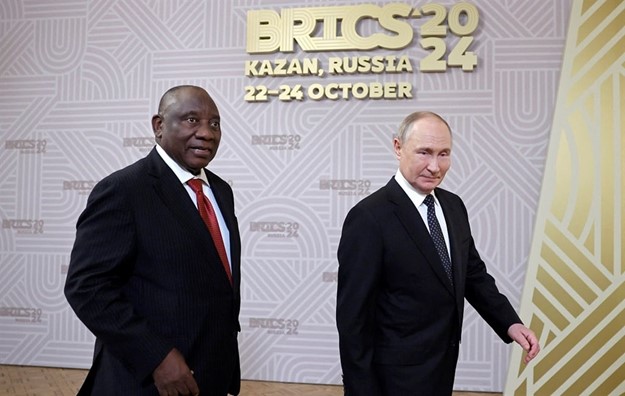President Cyril Ramaphosa briefed Russian President Vladimir Putin on the Government of National Unity on Tuesday afternoon. Ramaphosa will also brief other world leaders on the GNU’s establishment and how it was “evolving”. The President is leading a South African delegation at the XVI (16TH) Summit in Kazan capital of Russia’s Tatarstan’s region. Ramaphosa delivered his remarks during a meeting with Putin at the Kremlin Residence shortly after arriving in Kazan for the Summit. Ramaphosa thanked Putin for being a loyal ally to Pretoria.
He said: “We are also delighted to be here to brief you and others of the journey that we have embarked upon as South Africa. We have formed a government of national unity (GNU) following our elections in May this year. “We will have time, as I briefed you on the telephone, to talk about that and inform you how the whole process of governing South Africa with a number of other parties is evolving as we have sought to unite and stabilise the country politically.” This is not the first time that Ramaphosa has briefed his counterparts on the GNU. In July, US President Joe Biden rang Ramaphosa to congratulate him on being elected for a second term and commended him for “successfully” forming the GNU. In recent years, Ramaphosa has also used the world stage to explain South Africa’s position on the Ukraine, Russia, and the Palestine, Israel conflicts.
Pretoria has been criticised for its close ties with Russia and pro-Palestine stance – this has led to perceived tensions with the West.
Ramaphosa is nostalgic for his liberation struggle roots when the former Soviet Union had offered military training to the African National Congress (ANC). He sees former KGB officer Putin as a close ally and friend. Ramaphosa has also argued against the hypocrisy of the west in opposing the war Russia is waging in Ukraine when they did nothing to stop and even participate in the war the United States under then President George W Bush waged in Iraq. Ramaphosa for his part appears confident in the set up of the GNU and its conduct on the national scene. This is certainly surprising given some of the ill feeling towards it. Ramaphosa says that his main concern in forming the GNU is unity and stability. However, to impress investors Ramaphosa must show that the GNU or grand coalition call it what you will has the stamina and experience to deliver.
This is what it means to be a part of BRICS even if you lead an authoritarian regime like some of the other member states. South Africa still needs to balance it out between the western world and BRICS. The African continent in terms of South Africa’s immediate neighbours should be a support base.
According to the Presidency, this year’s meeting will take place under the banner of Strengthening Multilateralism for Just Global Development and Security. Presidency spokesperson Vincent Magwenya said during their meeting Ramaphosa would further communicate the priorities of the seventh administration, highlight Russia’s strategic importance to South Africa, and exchange views with his counterpart on issues of mutual interest. Ramaphosa – accompanied by several cabinet ministers, including Ronald Lamola, Angie Motshekga, Khumbudzo Ntshavheni and Parks Tau – is expected to hold several meetings with BRICS leaders. Magwenya said BRICS plays an important role in a multipolar world, championing multilateralism, mutually beneficial cooperation, and sustainable development.
The president is allying himself with the major emerging economies in the world to stand on an equal footing with the powers of the western world. This concerns how the balance of power could be tipped in the other’s favour. Multilateralism is based on cooperation between nations based on mutual interests and finding common ground. However, in the long-term finding common ground with Putin may be difficult if he continues with his war in Ukraine. A protracted war is undesirable for an environment for trade. Minister of International Relations and Cooperation Ronald Lamola, Minister of Defence Angie Motshekga, Minister in the Presidency Khumbudzo Ntshavheni and Minister of Trade and Industry Parks Tau who are tasked with advising the president in his delegation need to remind him of this.
The world may be becoming more multi-polar than over twenty years ago but this has not led to lasting peace. Wars are breaking out across the world and even with in BRICS tensions are running high. Ethiopia and Egypt are just one case in point.
Presidential Spokesperson Magwenya went on to say:
“A founding value of BRICS is the shared vision of the urgent need to restructure global political, economic, and financial governance to be more fair, just, and representative. The expanded BRICS now covers 43% of the world’s population, 32% of the world’s land area, around 35% of global GDP, and 20% of world exports and provides opportunities to develop mutually beneficial cooperation that contributes to the sustainable growth and development of South Africa.
Breaking down the hegemony of the United States and the European Union is one thing but in order to build a shared vision requires mutual interests. It is necessary to create bridges rather than erect barriers. The significant factors in favour of BRICS are that three of the world’s major economies are members, and they have the largest populations in the world. Between them. These are Brazil, India, and China. However South Africa has more in common with India being a flexible economy with good trade relations with its immediate neighbours. Pretoria must never lose sight of that.
Regardless of who is in office.
Article written by:
Yacoob Cassim
Journalist at Radio Al Ansaar






